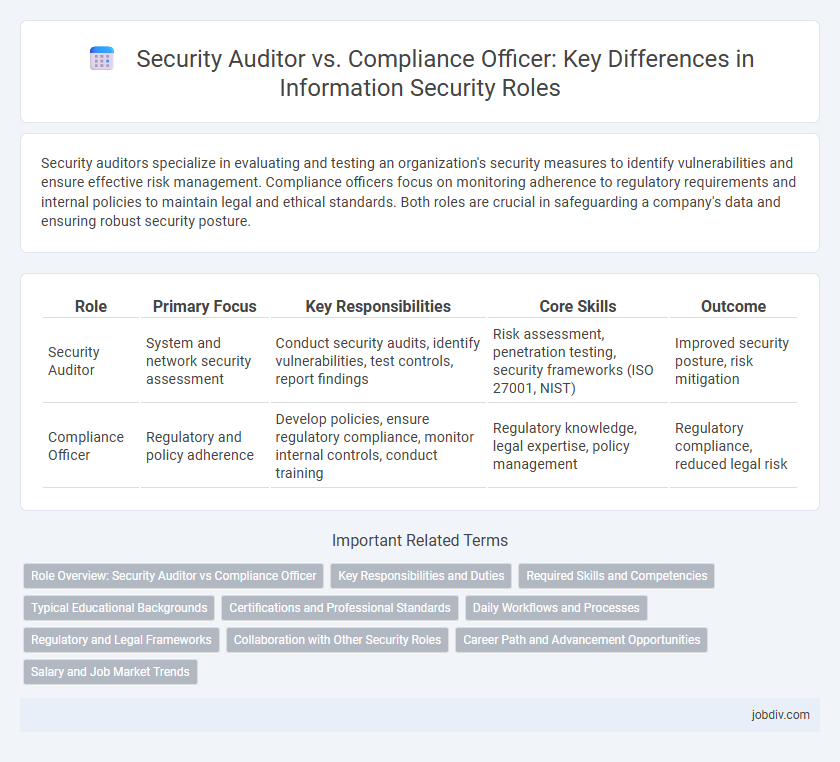Security auditors specialize in evaluating and testing an organization's security measures to identify vulnerabilities and ensure effective risk management. Compliance officers focus on monitoring adherence to regulatory requirements and internal policies to maintain legal and ethical standards. Both roles are crucial in safeguarding a company's data and ensuring robust security posture.
Table of Comparison
| Role | Primary Focus | Key Responsibilities | Core Skills | Outcome |
|---|---|---|---|---|
| Security Auditor | System and network security assessment | Conduct security audits, identify vulnerabilities, test controls, report findings | Risk assessment, penetration testing, security frameworks (ISO 27001, NIST) | Improved security posture, risk mitigation |
| Compliance Officer | Regulatory and policy adherence | Develop policies, ensure regulatory compliance, monitor internal controls, conduct training | Regulatory knowledge, legal expertise, policy management | Regulatory compliance, reduced legal risk |
Role Overview: Security Auditor vs Compliance Officer
Security auditors assess an organization's information systems and security controls to identify vulnerabilities, ensure regulatory adherence, and recommend improvements. Compliance officers develop and enforce policies to maintain organizational compliance with laws, regulations, and internal standards, focusing on risk management and legal requirements. Both roles collaborate to enhance security posture but differ in scope, with auditors emphasizing technical evaluation and compliance officers concentrating on policy enforcement.
Key Responsibilities and Duties
Security auditors conduct comprehensive assessments of organizational systems, identifying vulnerabilities and ensuring controls comply with security policies and standards. Compliance officers monitor adherence to regulatory requirements and internal policies, developing frameworks that mitigate legal risks and maintain corporate governance. Both roles collaborate to enforce security protocols, with auditors focusing on detection and evaluation, while compliance officers emphasize prevention and regulatory alignment.
Required Skills and Competencies
Security auditors require strong analytical skills, proficiency in risk assessment, and deep knowledge of cybersecurity frameworks such as ISO 27001 and NIST. Compliance officers must possess expertise in regulatory requirements like GDPR and HIPAA, excellent communication skills, and the ability to develop and enforce company-wide compliance programs. Both roles demand attention to detail, ethical judgment, and a thorough understanding of organizational security policies.
Typical Educational Backgrounds
Security Auditors typically hold degrees in computer science, information technology, or cybersecurity, complemented by certifications such as CISSP, CISA, or CEH that validate their expertise in risk assessment and vulnerability management. Compliance Officers often possess backgrounds in law, business administration, or finance, with certifications like CCEP or CRCM emphasizing regulatory knowledge and adherence to industry standards. Both roles require specialized education tailored to their distinct responsibilities in maintaining organizational security and regulatory compliance.
Certifications and Professional Standards
Security Auditors typically hold certifications such as Certified Information Systems Auditor (CISA) and Certified Information Security Manager (CISM), emphasizing technical expertise in auditing information systems and security controls. Compliance Officers often pursue Certified Compliance & Ethics Professional (CCEP) or Certified Regulatory Compliance Manager (CRCM) credentials, focusing on regulatory adherence and organizational policies. Both roles adhere to professional standards like ISO/IEC 27001 for information security management and frameworks such as NIST, but auditors concentrate on assessing controls while compliance officers ensure ongoing adherence to legal and ethical guidelines.
Daily Workflows and Processes
Security Auditors conduct thorough assessments of organizational systems, reviewing access controls, vulnerability reports, and incident logs to identify security weaknesses and ensure adherence to internal policies and regulatory standards. Compliance Officers, on the other hand, oversee the implementation of regulatory requirements, develop compliance frameworks, and coordinate training programs to maintain ongoing adherence to legal guidelines like GDPR, HIPAA, and SOX. Both roles involve regular collaboration with IT, legal, and risk management teams to continuously monitor, update, and enforce security and compliance protocols throughout daily operations.
Regulatory and Legal Frameworks
Security auditors evaluate an organization's adherence to industry-specific regulatory and legal frameworks by conducting thorough assessments of security controls and risk management processes. Compliance officers ensure ongoing conformity with laws such as GDPR, HIPAA, and SOX by designing and implementing policies that align with these requirements. Both roles collaborate to maintain a robust compliance posture, reducing legal risks and safeguarding sensitive data.
Collaboration with Other Security Roles
Security auditors collaborate closely with compliance officers to ensure that cybersecurity frameworks meet regulatory requirements and internal policies. Compliance officers provide critical guidance on legal standards, helping auditors focus assessments on areas with the highest risk of non-compliance. This synergy enhances the organization's overall security posture by aligning audit findings with compliance strategies.
Career Path and Advancement Opportunities
Security auditors specialize in evaluating and testing an organization's security systems, often advancing to roles such as senior auditor, IT security consultant, or Chief Information Security Officer (CISO) by gaining expertise in risk assessment and penetration testing. Compliance officers focus on ensuring adherence to regulatory requirements and internal policies, progressing into positions like compliance manager, risk manager, or corporate compliance director by developing skills in legal frameworks, regulatory environments, and internal control systems. Both career paths offer opportunities for advancement in cybersecurity management, risk management, and governance, with auditors leaning toward technical expertise and compliance officers emphasizing regulatory and ethical standards.
Salary and Job Market Trends
Security Auditors earn an average salary ranging from $70,000 to $110,000 annually, driven by expertise in risk assessments and vulnerability testing, while Compliance Officers typically receive between $65,000 and $105,000, emphasizing regulatory adherence and policy enforcement. Job market trends indicate a growing demand for Security Auditors due to increasing cyber threats and the need for proactive security measures, whereas Compliance Officers remain essential in heavily regulated industries like finance and healthcare. Both roles experience steady growth, but Security Auditors show a faster salary increase linked to evolving cybersecurity challenges and technical skill requirements.
Security Auditor vs Compliance Officer Infographic

 jobdiv.com
jobdiv.com